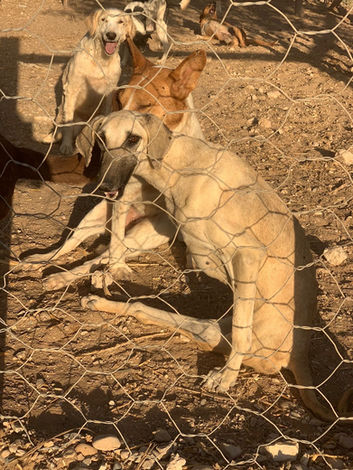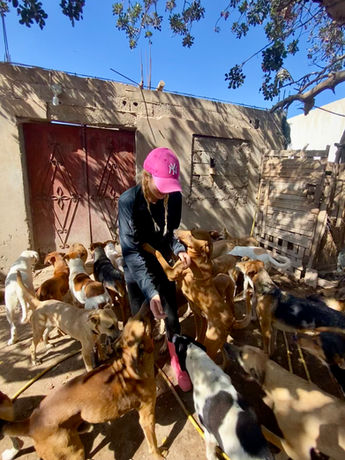Morocco
Dakhla & Aourir























The animal welfare situation in Morocco is catastrophic , and the generally described negative attitude of the population towards stray animals in many countries is becoming even more acute in Muslim countries with regard to dogs, as they are considered “untouchable animals” for religious reasons.
Unfortunately, many street dogs are deliberately mistreated (beaten, mutilated with knives or doused with hot broth) or killed. "Clean-up operations" ordered by regional politicians also take place again and again, where targeted mass killings (by poisoning or shooting) of street dogs are carried out.
In addition, there are countless traffic accidents in which street dogs and cats often suffer serious injuries - very often the animals are hit on the rear end when crossing the road and suffer severe nerve damage and even paraplegia as a result of the impact.
Morocco came to our attention when Patricia spent almost two months in Dakhla, in the very south of Morocco, in 2021 and was shocked by the suffering of the countless stray dogs who fought for their survival every day in the desert area there. She began to drive around the area every day to provide the animals with food and water and tried to find people or organizations in the region who were committed to helping the stray animals, which turned out to be no easy task.
Equipped with donations of money and goods as well as medicines, Patricia flew to the region again for a month in 2022 and intended to set up a small shelter for dogs with a local Moroccan acquaintance. Tragically, Lahcen died a short time later in a car accident at the age of just 34, and the project came to a standstill.


However, the suffering of the animals that Patricia had seen in Morocco did not let her go, and so in 2023 she traveled back to Morocco, to Aourir (greater Agadir area) , where she worked for over a month in a privately run animal shelter, in which more than 700 dogs and cats are housed in conditions that initially made Patricia doubt whether this was still animal welfare work. The dog enclosures there are jam-packed, many cats have to be housed in small transport boxes if necessary, new, often seriously injured animals arrive at the animal shelter almost every day, some of which can only be given emergency medical care by laypeople, sick and contagious animals can often only be separated in emergency shelters if necessary, the noise level is massive, the few workers on site are exhausted and overwhelmed.
Patricia was horrified by the conditions on site and tried to understand how this horrific overall situation could be explained and possibly improved.
Due to the catastrophic animal protection situation in Morocco, the number of (stray) animals in need of help is unimaginably high, while the number of people who privately set up and run institutions to protect animals is relatively small .
The few animal shelters/animal welfare facilities are flooded with animals and, in their desperation, often take in far more animals than the facility could fundamentally bear, as they know that they are often the only aid facility in the region and that turning away an (injured or sick) animal would often mean its certain death on the street.
The animal shelter where Patricia worked has to pay 10,000 euros a month just for food ! In addition, there are significant costs for employees and for veterinary care for sick and injured animals, as well as for castrations.
It is a constant struggle for financial survival and for the survival and well-being of the individual animals, which unfortunately can only be guaranteed to a very limited extent due to the large number of animals housed there. The animal shelter is also faced with hostility and attacks from neighbors who simply do not want animals there and who are waging a legal war with the aim of having the animal shelter cleared, but who have also carried out "poison bait attacks" on the enclosures from outside, which have claimed the lives of several dogs.

The overall situation in Morocco is simply terrible.
Finding a new home for the animals on site is naturally difficult, especially when it comes to dogs, as people in Morocco do not generally keep dogs as pets (if at all, they are kept as guard dogs and live on a chain). The animal shelter is therefore dependent on foreign adoptions, which is of course difficult, as there are extensive costs for each individual animal before it is even ready to leave the country (vaccinations, especially rabies vaccination including titer determination, castration, flight ticket, transport box, etc.).
During her time in Morocco, Patricia not only worked actively on site, but also made a fundraising appeal for the association and was able to raise over 12,000 euros to support the animal shelter. Most of the money was urgently needed for food and vet visits, but Patricia also wanted to enable a few animals to travel to a better future and financed the cost package for the departure of three dogs who were physically disabled as a result of car accidents and who can now lead a new, happy life in Spain, as well as two disabled cats who have found a wonderful home in Tyrol.
Given the catastrophic conditions that exist across the country, the adoption of individual animals is of course just a drop in the ocean, even if it changes the whole world for the animal in question, which for us personally always seems worth every euro and every effort.
Overall, however, we believe that the most sensible way to support Moroccan animal welfare organizations is to jointly organize and carry out castration projects on site in order to get the exploding numbers of stray animals under control in the long term and thus sustainably reduce the unnecessary suffering of stray animals.
Patricia was already on site in March 2024, together with a group of Spanish veterinarians and animal rights activists from Salvando Peludos (see Spain ), for such a project to have several hundred street dogs and cats in 2 regions neutered and, if necessary, provided with medical care during a 5-day collaboration.
Our main focus as an association in Morocco will continue to be on carrying out and supporting castration projects and only occasionally on financial support for individual animal shelters or associations. Since the adoption of animals from Morocco is costly and time-consuming, we do not offer regular placement assistance.

However, if you would like to give an animal from Morocco a new home, please feel free to contact us and we can advise you or provide case-specific placement assistance.
Impressions of Dakhla & Aourir
Leone... one of many
Leone's fate is representative of the countless animals that fall victim to road traffic in Morocco and suffer serious injuries. Leone was a street dog who was peacefully napping under a parked car when the car started and Leone was accidentally run over.
Luckily, the driver took Leone to the animal shelter, and from there he and Patricia went to the vet, where it was discovered that his right front and back legs were broken. Compared to many other Moroccan street dogs who suffer lifelong nerve damage and paralysis as a result of a car accident, Leone was "lucky" (in his misfortune).





However, Leone's case and his slow recovery process, during which Patricia tried to support him with love and care every day , sadly shows that due to the catastrophic conditions on site (permanent overcrowding of the animal shelter, lack of staff, time and financial resources for ongoing veterinary treatment and medication), even relatively "harmless" injuries often leave the animals with lifelong limitations , as high-quality medical care cannot be guaranteed and the animals often never fully recover physically from their injuries.




















